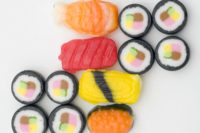

“Tunnock’s Teacakes, anyone?” To those who aren’t familiar with the confection, one might think that a scone-like product that’s typically served with afternoon tea was being offered. But ask any Scotsman (or woman) worth his/her brogue, and they’d tell you otherwise.
This delicate chocolate-enrobed confection consists of a biscuit base supporting a healthy dollop of Italian meringue cream. In production since the early 1960s at T. Tunnock Ltd. in Uddingston, Scotland, a suburb just outside Glasgow, Tunnock’s Teacakes are sold throughout the UK and in 30-plus countries to the delight of all.
The Teacakes, together with sister products Caramel Wafers, Snowballs and Caramel Logs, comprise the entire confectionery lineup for the 121-year old, fourth-generation company that integrates tradition with technology.
Boyd Tunnock, the 78-year-old grandson of founder Thomas Tunnock, continues to demonstrate how a long-term investment strategy combined with personal integrity and ingenuity has enabled a midsized enterprise to prosper amidst an intensely competitive confectionery landscape.
Having garnered Europe’s highest confectionery recognition, the European Candy Kettle Club Award in 1999, Boyd has refused to rest on his copper laurels.
“We’ve been continually upgrading the plant to keep up the standards,” he says.
Of course, Boyd’s - and his family’s (daughter Karen Loudon and son-in-law Fergus Loudon head up operations and sales/operations, respectively) - standards are set fairly high.
Despite the company’s relatively modest size - sales topped £35 million ($58 million) in 2010 - investments reached £5 million ($8.3 million) last year. In typical Scottish fashion, all of the capital expenditures were self-financed.
“We’ve always invested our own money, that is the profi ts, back into the business,” Boyd explains.
The equipment installed last year ranges from several Bosch Packaging Technologies flow-wrappers, foil wrappers and a robotic multi-packer to a Rotzinger stacker and a Schubert pick ‘n place robotic packer.
This month, the company already has installed a second Schubert robotic packer as well as a new Sollich enrobing line. There’s more on the drawing boards, but as the ever-charming and charismatic Boyd points out,
“You need to let things breathe a bit,” to let the mechanics, electricians and operators become familiar with the new equipment and capabilities. A walk through the four-story, 200,000-sq.-ft. facility quickly reaffirms the Tunnock family’s commitment to remain current in processing technology.
As Boyd explains, the use of robotic systems was introduced fairly early at the plant, going back 10 years when the company installed an OPM robotic packer for its Caramel Logs product. Successive investments since then have helped the company improve efficiency and productivity as well as meet retailer demands for multipacks.
The push toward more automated processes, however, has not affected the company’s philosophy regarding quality.
As Boyd simply says, “I like what I make, myself, and what I like, I make.”
Consequently, Tunnock Ltd. is one of the few companies that produce caramel-filled wafers. Here, too, Boyd ensures that there are no shortcuts taken in caramel production,
Although the company uses a Ter Brak continuous cooker, it didn’t take long for Tunnock’s managing director to realize that the flash cooker used to brown the milk content of the caramel and drive off moisture, drove off flavor as well.
Consequently, caramel is drawn from the continuous cooker and pumped into a retention kettle to give it some “residence time” as a means of ensuring a full caramel flavor note. Moreover, to further preserve that flavor note, all caramel produced during the two- , and at times three-shift, operation at the plant is used within 24 hours.
Nearly 10 tons of caramel is made daily on site. All of the wafers come off five oven lines, three of which have 81 plates and two 99 plates. Caramel is pumped into a creaming station where the caramel is applied to create four layers amidst five wafer sheets.
The sheets then travel to a Hebenstreit spiral cooling system where they undergo chilling for 10 minutes before being cut to size and then stored for 24 hours.
As Boyd explains, it’s important to let the caramel rest, thus allowing moisture migration. During that migration, the caramel expands, which would cause a variety of quality control issues if the wafers were immediately enrobed.
Once the wafers have gone through the curing period, they are slightly trimmed to remove excess caramel and fed toward a slitting machine.
After slitting, the caramel sticks head toward a high-speed Sollich double enrober before they travel toward cooling and packing.
After cooling, the wafers head toward a Rotzinger stacker, which accumulates the wafer sticks and feeds them as needed to a Bosch Sapal DPN7 flow-wrapper that runs at 400 pieces per minute. Capable of providing 10 minutes of hold time, the Rotzinger stacker has helped reduce downtime issues that typically frequent minor stoppages in high-speed wrapping lines.
Once the wrapped caramel pieces leave the Sapal unit, they head toward a HCM SIG biscuits a week, which are used as a base for the Teacakes. Prior to feeding the biscuit bases to the Teacake production lines, they undergo a 48-hour conditioning period.
Afterwards, they are fed into a 16-nozzle depositing line that perfectly squeezes out a golf ballsized dollop of Italian meringue onto the biscuit base. The naked Teacakes then travel through a cooling tunnel to set before they head toward a Sollich enrober for dual layer of chocolate. Tunnock Ltd. produces both milk and dark chocolate varieties.
Once cooled, the Teacakes head toward a Bosch foil wrapper before proceeding to a Schubert robotic pick ‘n place unit, which employs eight arms to place the pieces into 6-count boxes. With a second Schubert robotic unit installed last month, Tunnock Ltd. expects to keep pace with demand as expanded distribution pushes sales higher.
It’s important to note that similar to caramel, the company produces its own chocolate and Italian meringue. Using a series of fi ve MacIntyre refiner/ conches, the company processes 70 to 75 tons of chocolate made with pure cocoa butter and cocoa liquor each week.
With regards to the Italian meringue, which is used for both the Teacakes and Snowballs, Tunnock Ltd. imports albumen crystals from the United States to ensure the right consistency for the cream.
“It costs a little more, since most companies don’t supply albumen in crystal form, but it’s better product as a result.”
Thus, it’s not surprising that the company also toasts its own coconut. With a knowing grin, Boyd says that quality isn’t the only reason Tunnock Ltd. takes that extra step.
“It’s more economical,” he says. Not surprisingly, it’s been economies of scale that have helped the company hold its own within the fiercely competitive UK market.
Exports have also played a role, with Saudi Arabia and Canada being the two largest import markets for the company’s unique products, and accounting for nearly 15% of all revenues.
Opportunities continue for further export expansion as the company pursues avenues in the United States as well as other emerging markets. Boyd believes that the quality as well as the uniqueness of the company’s product lines bodes well for the future.
Underscoring the fact that the family’s operating philosophy precludes discounting, Boyd believes strongly that consumers value quality and taste, particularly in these post recessionary times. As he notes, at Tunnock Ltd. neither the price nor the size of the product have come down.
He also sees additional growth opportunities in leveraging the power of the existing brands, such as the most recent successful debut of the company’s Mini Caramel Wafers, snack-sized versions (three wafer layers featuring two layers of caramel) of the originals packed in a tub.
“It’s probably something we could probably do with Teacakes or Snowballs,” Boyd says. Whatever brand leveraging the company decides to pursue, it’s clear that it will be done in the Tunnock tradition, which means done right.



